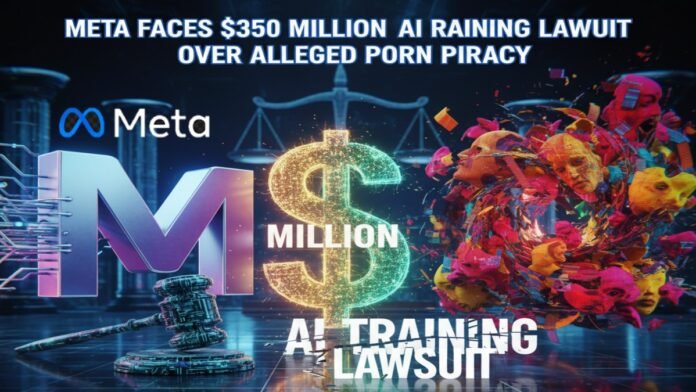
Key Points:
- Strike 3 Holdings alleges Meta downloaded 2,396 adult films via BitTorrent since 2018 using concealed IP addresses
- Lawsuit seeks $350 million (approximately ₹2,900 crore) in damages and permanent injunction
- Meta filed motion to dismiss, calling allegations “absurd and unfounded” based on speculation
- Company claims any downloads were for personal employee use, not AI training purposes
- Meta argues timeline impossible downloads began 2018, major AI projects started 2022
- Strike 3 alleges Meta operated “stealth network” of 2,500 hidden IP addresses
- Meta counters by labeling Strike 3 a “copyright troll” seeking extortive settlements
- Court decision pending Strike 3 has two weeks to respond to dismissal motion
California: Meta Platforms is embroiled in one of the most controversial copyright lawsuits in the AI industry, with adult entertainment producer Strike 3 Holdings accusing the social media giant of systematically pirating thousands of pornographic films to train its artificial intelligence models. The case, filed in the Northern District of California, raises fundamental questions about how tech companies acquire training data and the ethical boundaries of AI development.
The Allegations: Systematic Copyright Infringement
Strike 3 Holdings claims it discovered Meta’s corporate IP addresses downloading its copyrighted content through the BitTorrent peer-to-peer file-sharing network. According to the lawsuit filed in July 2025, Meta allegedly infringed at least 2,396 “award-winning, critically acclaimed” adult films owned by the studio, often downloading content on the same day it was released.
The studio’s investigation allegedly identified 47 IP addresses owned by Facebook (Meta) used to download and distribute copyrighted material. More alarmingly, Strike 3 claims Meta concealed its activities through a “stealth network” comprising over 2,500 hidden IP addresses, utilizing “off-infra” IP addresses and Virtual Private Clouds (VPCs) to mask its torrenting operations.
The lawsuit alleges these downloads began in 2018 and continued systematically, with the specific purpose of training Meta’s generative AI systems, including Movie Gen, a cutting-edge video generation model, and the LLaMA language models. Strike 3 argues that pornographic content provides unique visual angles, extended scenes, and diverse human interactions rarely found in mainstream media, making it valuable for AI training.
Meta’s Defense: Personal Use, Not Corporate Policy
Meta has categorically denied all allegations, filing a motion to dismiss the lawsuit in late October 2025. The company characterizes Strike 3’s claims as “nonsensical and unsupported,” constructed through “guesswork and innuendo” rather than factual evidence.
The tech giant’s defense rests on several key arguments. First, Meta emphasizes that the alleged downloads occurred sporadically, approximately 22 titles annually, and were “intermittently obtained one file at a time,” suggesting individual personal consumption rather than coordinated corporate data harvesting.
Meta also highlighted a critical timeline inconsistency: the alleged downloads began in 2018, four years before the company commenced its multimodal and generative video research in 2022. According to Meta, this temporal gap makes Strike 3’s central allegation technically implausible.
The company further distanced itself from responsibility by noting that “tens of thousands of employees,” plus contractors, visitors, and third parties, access its network daily. Meta cited one specific incident involving a contractor allegedly torrenting content at his father’s house, calling this “plainly indicative of personal consumption” with “no apparent basis” for sourcing training data.
The AI Training Question: Technical and Ethical Dimensions
Meta has challenged the fundamental premise that adult content would benefit its AI models. The company’s terms of service explicitly prohibit generating or training on pornographic or sexual content, a policy that Meta argues contradicts the notion that such materials would be useful for AI development.
“We don’t want this type of content, and we take deliberate steps to avoid training on this kind of material,” a Meta spokesperson told media outlets, adding that the idea pornography could enhance AI model performance is “inaccurate and absurd”.
However, Strike 3’s lawsuit suggests pornographic content offers specific advantages for video AI training. Adult films typically feature extended scenes with diverse camera angles, complex human interactions, and varied lighting conditions, attributes that could theoretically help AI models understand motion, human anatomy, and visual composition more comprehensively.
Movie Gen: The AI System at the Center
Meta Movie Gen, one of the AI systems allegedly trained on the disputed content, represents a significant advancement in generative video technology. Launched in October 2024, Movie Gen can generate high-definition videos up to 16 seconds long from text prompts, perform precise video editing, create personalized videos by incorporating user images, and generate synchronized audio, including sound effects and background music.
The system was trained on approximately 1 billion image-text pairs and 100 million video-text pairs, using sophisticated techniques like flow matching and multiple text embedding systems. It supports various aspect ratios and achieves what Meta describes as “state-of-the-art” results in video quality.
Strike 3 Holdings: Copyright Enforcer or Legal Troll?
Meta has aggressively challenged Strike 3’s credibility, accusing the studio of employing “extortive” legal tactics and characterizing it as a “copyright troll” that files mass lawsuits to force settlements rather than genuinely protect intellectual property.
Strike 3 Holdings, a Miami-based company producing content through websites like Vixen, Blacked, and Tushy, has indeed become one of the most prolific copyright litigants in the United States since 2017. The company files hundreds of lawsuits annually against individuals identified by IP addresses allegedly linked to unauthorized downloads, typically demanding settlements ranging from $18,000 to $40,000.
Federal judges in California, New York, and Illinois have expressed increasing skepticism toward Strike 3’s litigation model, questioning the reliability of IP-based evidence and whether the company genuinely pursues trials or merely seeks embarrassing settlements. Defense attorneys have successfully argued that Strike 3 engages in “copyright trolling,” and that monitoring software used to track IP addresses may not meet evidentiary standards.
Network Monitoring and Legal Responsibility
Meta has also challenged the expectation that it should comprehensively police every file downloaded across its global corporate network. “Monitoring every file downloaded by any person using Meta’s global network would be an extraordinarily complex and invasive undertaking,” the company argued, citing legal precedent requiring only “simple measures” to curb infringement rather than exhaustive surveillance.
On the “stealth network” allegation, Meta questioned Strike 3’s logic: “Why would Meta seek to ‘conceal’ certain alleged downloads… but use easily traceable Meta corporate IP addresses for many hundreds of others?” The company suggests this inconsistency undermines the conspiracy theory Strike 3 attempts to construct.
Broader Implications for the AI Industry
This lawsuit arrives as nearly every major AI company faces similar copyright infringement allegations. The technology industry’s race to develop increasingly sophisticated models has created enormous demand for training data, leading to accusations that companies systematically violate copyright law to gain competitive advantages.
Legal experts suggest Strike 3’s case may have a stronger footing than previous AI copyright lawsuits due to the specificity of its evidence—identified IP addresses, documented download dates, and alleged attempts at concealment. If successful, the lawsuit could establish precedents affecting how AI companies acquire training data and their liability for content accessed through corporate networks.
What Happens Next
Strike 3 Holdings has two weeks from Meta’s October 2025 dismissal motion to file its response. If the court denies Meta’s dismissal request, the case would proceed to discovery, potentially revealing internal Meta communications about AI training data sources and network usage policies.
A victory for Meta would not only avoid the $350 million damages claim but also reinforce its position that video AI tools are designed to exclude explicit material. Conversely, a decision favoring Strike 3 could expose Meta to additional copyright claims and force greater transparency about AI training practices.
The case ultimately tests whether tech companies can be held liable for employee actions on corporate networks, how copyright law applies to AI training data, and whether the courts will accept IP address evidence as sufficient proof of systematic corporate infringement. The outcome could reshape data acquisition practices across the entire artificial intelligence industry.





















































